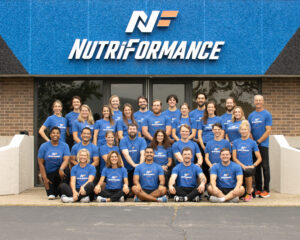March is National Nutrition Month®, a yearly event which calls attention to the importance of making informed food choices and developing sound eating and physical activity habits.
Our theme this year is “Eat Right, Your Way, Every Day,” which encourages personalized healthy eating styles and recognizes that food preferences, lifestyle, cultural and ethnic traditions and health concerns all impact individual food choices.
Registered dietitians play a critical role in helping people eat right, their way, every day. The expertise, training and credentials that back a registered dietitian make them the experts in developing a personalized nutrition plan just for you or your family. When your family sees an RD, the last thing they’ll get is one-size-fits-all diet advice. After learning about you or your family’s health history, favorite foods, eating and exercise habits, an RD will help set goals and prioritize, putting you and your family on the path to lowering weight, eating healthfully and reducing the risk of chronic diseases.
For more information on how to celebrate National Nutrition Month, consult a registered dietitian in your area and visit our National Nutrition Month section at eatright.org.
CELEBRATE YOUR PLATE
There are many different ways to “Eat Right, Your Way, Every Day” and celebrate a healthier lifestyle through proper nutrition. Here are just a few recommendations:
Make Half Your Plate Fruits and Veggies
Eating a variety of fruits and vegetables can give you the energy, fiber, vitamins and minerals needed to sustain a healthy lifestyle. Remember to incorporate a variety of color such as red, orange, green, and purple as well.
Go for Whole Grains
When eating breads, cereals, pastas, crackers, and rice try to make at least half of what you’re consuming WHOLE grains. To be sure check the ingredients list to make sure the word “whole” is included.
Stick to Low-Fat or No-Fat Dairy
Fat-free and low-fat milk contain the same amount of calcium and other essential nutrients as whole milk, but with FAR fewer calories and fat. If You are lactose intolerant, you can try lactose-free milk or a calcium-fortified soy beverage instead.
Vary Your Protein
Seafood, nuts and beans, as well as lean meat, poultry and eggs are all excellent protein sources. Be sure to vary the ways you get your protein by switching it up within these categories. Be sure and try to have a seafood protein twice a week for additional heart-health benefits provided by omega-3s.
Cut Back on the Added Sodium, Sugar, and Fat
Compare foods and choose those with lower numbers for sodium, sugar, and fat. Find healthier alternatives to adding flavor to your food such as seasoning your foods with herbs and spices instead of salt. Switch from solid fats to healthy oils like olive and canola oil. Replace sugary drinks with water and choose fruit for dessert.
Control Your Portions
Always be aware when your eating a meal or snack. Avoid mindless munching that often leads to overeating and unnecessary calorie consumption. Focus on your meals and STOP eating when you are satisfied. Use smaller plates, bowls, and glasses as an added measure.
The Academy of Nutrition and Dietetics. National Nutrition Month

Why Multiple Health & Fitness Disciplines Under One Roof Really Matters!
Imagine a fitness center where personal trainers, registered dietitians, physical



